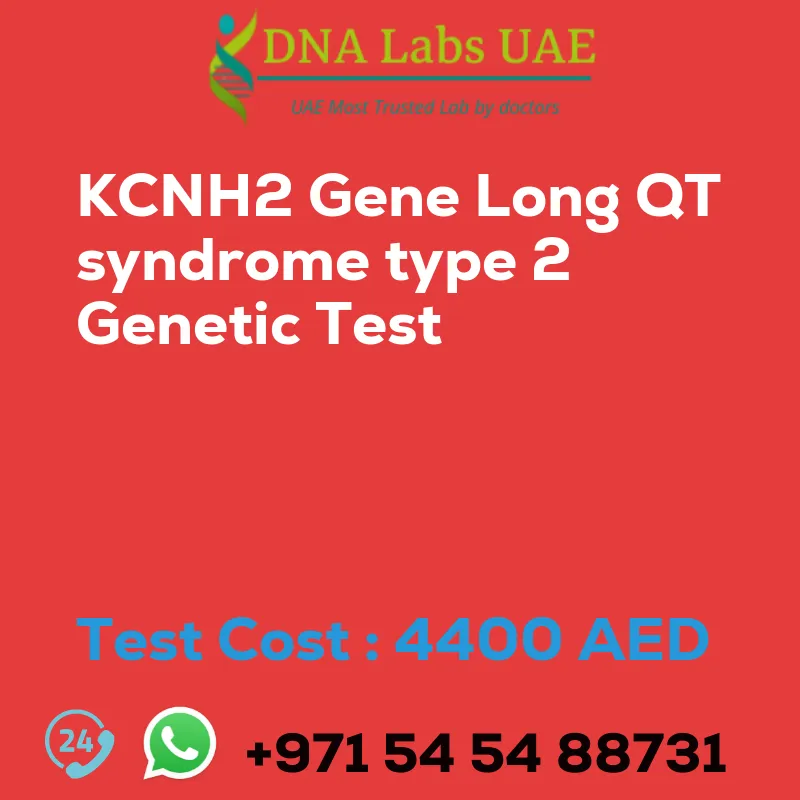KCNH2 Gene Long QT Syndrome Type 2 Genetic Test
Welcome to DNA Labs UAE, where we offer the KCNH2 Gene Long QT Syndrome Type 2 Genetic Test. This test is designed to diagnose and manage Long QT Syndrome Type 2, a genetic disorder that affects the heart’s rhythm.
Test Components
- Test Name: KCNH2 Gene Long QT Syndrome Type 2 Genetic Test
- Price: 4400.0 AED
- Sample Condition: Blood or Extracted DNA or One drop Blood on FTA Card
- Report Delivery: 3 to 4 Weeks
- Method: NGS Technology
- Test Type: Cardiovascular Pneumology Disorders
- Doctor: Cardiologist
- Test Department: Genetics
Pre Test Information
Prior to undergoing the KCNH2 Gene Long QT Syndrome Type 2 NGS Genetic DNA Test, it is important to provide the clinical history of the patient. Additionally, a genetic counseling session will be conducted to draw a pedigree chart of family members affected by the KCNH2 Gene Long QT Syndrome Type 2 NGS Genetic DNA Test gene KCNH2.
Test Details
The KCNH2 gene is responsible for encoding a protein called potassium voltage-gated channel subfamily H member 2, also known as hERG. This protein plays a crucial role in regulating the flow of potassium ions in the heart, which is essential for maintaining a normal heart rhythm.
Long QT Syndrome Type 2 (LQT2) is a genetic disorder characterized by a prolonged QT interval on an electrocardiogram (ECG). This prolonged QT interval increases the risk of developing life-threatening arrhythmias, such as torsades de pointes, which can lead to fainting, seizures, or sudden cardiac arrest.
NGS (Next-Generation Sequencing) genetic testing is a technique used to analyze multiple genes simultaneously to identify genetic variations or mutations that may be associated with a particular condition or disease. In the case of LQT2, NGS genetic testing can be used to identify mutations in the KCNH2 gene that are responsible for the disorder.
By identifying these mutations, healthcare professionals can provide a more accurate diagnosis, assess the risk of arrhythmias, and develop appropriate treatment strategies for individuals with LQT2. This may include lifestyle modifications, medication, or in some cases, implantation of a cardiac defibrillator.
It is important to note that NGS genetic testing for LQT2 should be performed and interpreted by qualified healthcare professionals with expertise in genetic testing and cardiovascular disorders. Genetic counseling may also be recommended to help individuals and their families understand the implications of the test results and make informed decisions about their healthcare.
| Test Name | KCNH2 Gene Long QT syndrome type 2 Genetic Test |
|---|---|
| Components | |
| Price | 4400.0 AED |
| Sample Condition | Blood or Extracted DNA or One drop Blood on FTA Card |
| Report Delivery | 3 to 4 Weeks |
| Method | NGS Technology |
| Test type | Cardiovascular Pneumology Disorders |
| Doctor | Cardiologist |
| Test Department: | Genetics |
| Pre Test Information | Clinical History of Patient who is going for KCNH2 Gene Long QT syndrome type 2 NGS Genetic DNA Test. A Genetic Counselling session to draw a pedigree chart of family members affected with KCNH2 Gene Long QT syndrome type 2 NGS Genetic DNA Test gene KCNH2 |
| Test Details |
The KCNH2 gene is responsible for encoding a protein called potassium voltage-gated channel subfamily H member 2, also known as hERG. This protein plays a crucial role in regulating the flow of potassium ions in the heart, which is essential for maintaining a normal heart rhythm. Long QT syndrome type 2 (LQT2) is a genetic disorder characterized by a prolonged QT interval on an electrocardiogram (ECG). This prolonged QT interval increases the risk of developing life-threatening arrhythmias, such as torsades de pointes, which can lead to fainting, seizures, or sudden cardiac arrest. NGS (Next-Generation Sequencing) genetic testing is a technique used to analyze multiple genes simultaneously to identify genetic variations or mutations that may be associated with a particular condition or disease. In the case of LQT2, NGS genetic testing can be used to identify mutations in the KCNH2 gene that are responsible for the disorder. By identifying these mutations, healthcare professionals can provide a more accurate diagnosis, assess the risk of arrhythmias, and develop appropriate treatment strategies for individuals with LQT2. This may include lifestyle modifications, medication, or in some cases, implantation of a cardiac defibrillator. It is important to note that NGS genetic testing for LQT2 should be performed and interpreted by qualified healthcare professionals with expertise in genetic testing and cardiovascular disorders. Genetic counseling may also be recommended to help individuals and their families understand the implications of the test results and make informed decisions about their healthcare. |








